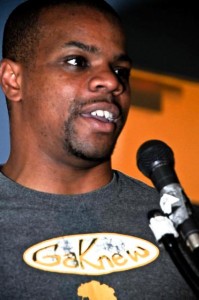All good things come in threes, so to top off this series of interviews I exchanged nouns, verbs, and punctuation with Houston’s own Marcell Murphy. A believer in the power of spoken word, Marcell discusses his literary influences and experiences, some of which have taken him abroad.
Marcell Murphy is a poet, spoken word artist, and writer from the Houston area.
GLASS MOUNTAIN: According to your bio, you are an international reading machine, having shared your work in places outside the United States such as Canada and Jamaica. What was it like to participate in these readings and interact with those of other literary traditions?
MARCELL MURPHY: Reading internationally was really wonderful. The exchange of ideas about different forms and the use of free verse were absolutely stimulating. The cultural exchanges were the greatest benefit; hearing about the evolution of poetry in different countries and the struggles and triumphs of being a poet in those countries made me realize how different the process can be and how strikingly similar a lot of the techniques and concepts are.
GM: Not too long ago, I attended a reading in which you were a participant, along with some other notable local writers. One of the things that immediately attracted me to your work was your delivery; it was both lively and powerful. What are your thoughts on public readings and presentation? Do you think readers have an obligation to their audience?
MM: Obligation is a bit strong; performing poetry and reading poetry both have their place. Performance poetry is more conversational and it’s a little more challenging to convey the use of language on stage. On the contrary, the ability to emotionally connect to the audience is therapeutic for the poet and, hopefully, for the audience member. This can vary by crowd; some audiences want to hear the conventions in your poetry and your use of language, and others want to be moved emotionally, so the reader has an obligation to be honest with who they are as a writer and a duty to convey the best message possible to their audience, no matter what kind it is.
GM: To add to the previous question, at the reading aforementioned, one of the poems you shared crafts a world in which the speaker struggles with high blood pressure. The poem’s language was lyrically interesting and somehow felt very autobiographical—to which you confirmed my inclinations, briefly commenting on the poem afterwards. How would you describe your poetical interests? Do you find yourself writing mostly about personal trauma or experience?
MM: It took me quite a while to start writing autobiographically; I was initially enthralled with social commentaries, political poems, and love. I learned from contemporaries and mentors that it’s necessary to test the borders of your writing. Writing from places that are not always comfortable will help me to become a more complete poet, so I believe that nothing is off limits when it comes to subject matter, even if it’s about me and my demons.
GM: Throughout the Houston community, you are an active voice within literary circles, namely among slam poets. What drew you to this art form and how do you think open, verbal connection informs your written work? Is the performance of your work something you keep in mind during the writing process?
MM: I went to my first slam in 2001 and was blown away. The fusion of great writing and performance really showed me the power of poetry beyond the page. There is a delicate balance between verbal connection and the written word. My goal is to perform in a way that supplies audience members with great content and a great performance without sacrificing either. That’s the amazing thing about slam—you get a fusion of both.
GM: I suppose it goes without saying that most writers are influenced by other artists they admire and respect—these allegiances can vary in degree, of course. I’m sure you have a few notable poets that have inspired you. However, possibly more interesting are the unexpected individuals that lend themselves to creative fervor. Are there any unconventional figures or objects that inform your writing?
MM: I have written poems based on the soundtrack of video games, graffiti art throughout the city, and even from the Opera (I have a number of short poems inspired by Bizet’s Carmen). Inspiration does not just come from one source and I have learned to be open to many different forms of art, and I am grateful for it all.
Once again, Glass Mountain invites you to attend its next reading on Tuesday, August 21. It’ll be well worth your time, even if you only wish to make a cameo appearance. You’ll hear from the likes of Marcell, as well as the other subjects of this literary one-on-one. We hope to see you there.
Amanda Scott
Assistant Fiction Editor



